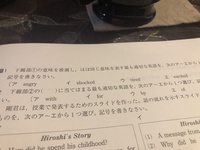好き嫌い
2015年02月26日
He doesn't like foreigners who commit crimes.
犯罪を犯す外国人は嫌いだ。
He doesn't like foreigners, who commit crimes.
犯罪を犯すから外国人は嫌いだ。
First sentence doesn't say the person dislikes all foreigners.
最初の文章では、彼がすべての外国人が嫌いだとは言っていません。
Foreigners who he or she doesn't like are those who commit crimes.
彼が嫌いだといっているのは、あくまで犯罪を犯すような外国人のことだけです。
Second sentence says he or she dislikes all foreigners because he or she thinks they are all criminals.
2番目の文章では、外国人のことを全員犯罪者だとみなしてしまっているようです。彼は偏見を持った人のようですね。
Don't hate criminals. Hate crimes.
犯罪者を憎まず、犯罪を憎め。
That's how I'm supposed to think.
この考えで臨みたいと思います。
Posted by Dice-ETC at 23:32 | Comments(0)
| 英語の世界
犯罪を犯す外国人は嫌いだ。
He doesn't like foreigners, who commit crimes.
犯罪を犯すから外国人は嫌いだ。
First sentence doesn't say the person dislikes all foreigners.
最初の文章では、彼がすべての外国人が嫌いだとは言っていません。
Foreigners who he or she doesn't like are those who commit crimes.
彼が嫌いだといっているのは、あくまで犯罪を犯すような外国人のことだけです。
Second sentence says he or she dislikes all foreigners because he or she thinks they are all criminals.
2番目の文章では、外国人のことを全員犯罪者だとみなしてしまっているようです。彼は偏見を持った人のようですね。
Don't hate criminals. Hate crimes.
犯罪者を憎まず、犯罪を憎め。
That's how I'm supposed to think.
この考えで臨みたいと思います。



















 (匿名希望の方はこちら)
(匿名希望の方はこちら)